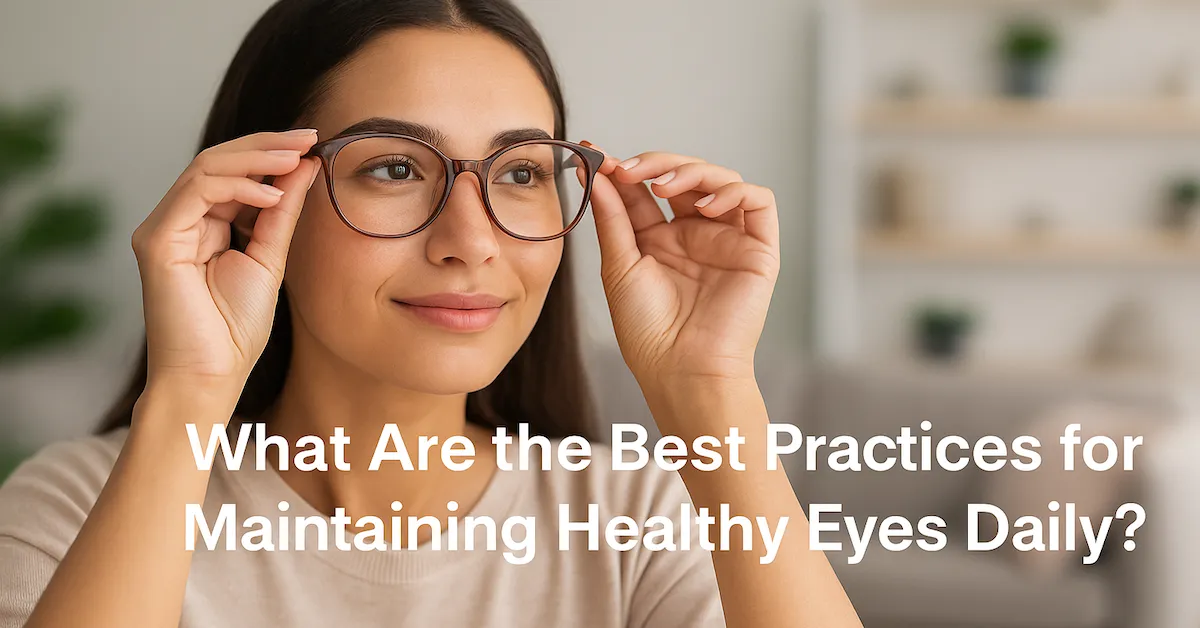
What Are the Best Practices for Maintaining Healthy Eyes Daily?
Your eyes work hard every day, from focusing on screens to adjusting to different lighting conditions. Taking care of them should be part of your daily routine, just like brushing your teeth or exercising. Good eye health habits can prevent strain, reduce the risk of vision problems, and keep your eyes feeling comfortable and clear as you age. Here are some of the best daily practices for maintaining healthy eyes.
Follow the 20-20-20 Rule for Screen Time
With so much of life revolving around screens, eye strain has become a common issue. Digital devices force your eyes to focus for long periods, which can lead to dryness, headaches, and blurred vision. The 20-20-20 rule is a simple and effective way to prevent digital eye strain. Every 20 minutes, look at something at least 20 feet away for 20 seconds.
This short break gives your eyes a chance to relax and refocus. You can also blink more often to keep your eyes moist or adjust screen brightness to match your surroundings. If possible, position your monitor slightly below eye level and about an arm’s length away for a more comfortable viewing angle.
Eat a Balanced, Eye-Friendly Diet
Nutrition plays a big role in maintaining eye health. Certain nutrients help protect your eyes from damage caused by aging, light exposure, and environmental stress. Foods rich in vitamin A, lutein, zeaxanthin, zinc, and omega-3 fatty acids are especially beneficial.
Add carrots, spinach, kale, oranges, eggs, and fish like salmon or tuna to your diet. These foods support the retina and prevent conditions such as dry eyes, macular degeneration, and night blindness. Staying hydrated also helps your eyes produce enough natural tears to stay lubricated and comfortable.
Wear Sunglasses with UV Protection
Exposure to ultraviolet (UV) rays can damage the eyes over time, increasing the risk of cataracts and macular degeneration. Wearing sunglasses with 100 percent UV protection is one of the easiest ways to protect your eyes outdoors.
Look for sunglasses labeled as “UV400,” which block both UVA and UVB rays. Wraparound styles offer extra protection from sunlight entering from the sides. Even on cloudy days, UV rays can still affect your eyes, so make wearing sunglasses a daily habit whenever you step outside.
Practice Good Hygiene with Contacts and Makeup
If you wear contact lenses, follow proper hygiene to prevent infection or irritation. Always wash your hands before handling lenses and use fresh solution each time you store them. Replace lenses as recommended and avoid wearing them for longer than prescribed.
For those who use eye makeup, remove it completely before sleeping. Avoid sharing eye products and replace mascara every few months to prevent bacteria buildup. Keeping your eyes clean reduces the risk of redness, itchiness, and infection.
Get Enough Rest and Manage Screen Use Before Bed
Rest is essential for eye health. During sleep, your eyes are lubricated and cleared of irritants like dust or smoke. Lack of sleep can cause dryness, twitching, and puffiness around the eyes. Aim for seven to eight hours of sleep each night.
Reduce screen exposure before bed to prevent eye strain and help your body wind down naturally. Blue light from phones and computers can interfere with sleep patterns, so consider using a blue light filter or switching to night mode in the evening.
Avoid Smoking and Control Chronic Conditions
Smoking harms not only your lungs but also your eyes. It increases the risk of cataracts, macular degeneration, and optic nerve damage. Quitting smoking can improve both eye health and circulation, allowing more oxygen and nutrients to reach your eyes.
If you have diabetes, high blood pressure, or high cholesterol, managing these conditions is equally important. They can affect blood vessels in the eyes, leading to vision complications over time. Regular checkups and a healthy lifestyle go a long way toward preventing serious eye problems.

Stay Active and Maintain a Healthy Lifestyle
Exercise improves blood flow, which benefits the small blood vessels that supply oxygen to your eyes. Simple activities like walking, yoga, or swimming can help reduce the risk of eye-related diseases caused by poor circulation. Staying active also supports overall health, which in turn supports your vision.
Avoid prolonged periods of eye strain from close-up work. Taking breaks during reading or crafting helps prevent fatigue and keeps your vision sharp.
Get Regular Eye Exams
Even if your vision seems fine, regular eye exams are essential. Many eye diseases develop slowly without symptoms, making early detection vital. Comprehensive exams can uncover signs of glaucoma, cataracts, or retinal damage before vision loss occurs.
Children should have their eyes checked regularly as they grow, and adults should schedule exams every one to two years. If you already wear glasses or have a family history of eye disease, yearly visits are recommended.
Conclusion
Healthy eyes depend on consistent daily care, balanced nutrition, and regular checkups. By protecting your eyes from strain, UV rays, and poor habits, you can maintain clear vision and reduce the risk of long-term problems. Small changes, like eating nutritious foods, wearing sunglasses, and taking screen breaks, make a lasting difference.
For personalized eye care and professional advice, Bellasee provides comprehensive services designed to protect and enhance your vision. Their experienced specialists use advanced diagnostic tools to ensure your eyes stay healthy at every stage of life. With Bellasee, you can enjoy the confidence that comes from seeing the world clearly and comfortably every day.